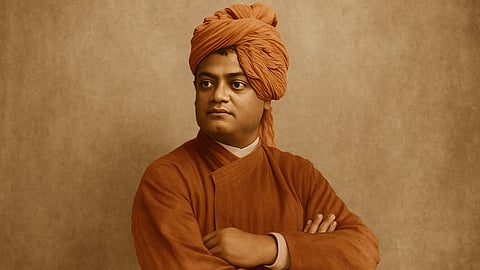
- Home
- न्यूजग्राम
- NewsGram USA
- India
- World
- Politics
- Entertainment
- Culture
- Lifestyle
- Economy
- Sports
- Sp. Coverage
- Misc.
- NewsGram Exclusive
- Jobs / Internships

On 11 September 1893, Swami Vivekananda addressed the World’s Parliament of Religions in Chicago
In his speech, he highlighted India’s tradition of sheltering persecuted communities and urged harmony among faiths.
Rooted in Sri Ramakrishna’s teachings, Vivekananda taught that all religions are true and serving humanity is the highest form of worship.
On 11 September 1893, a young Hindu monk from India, Swami Vivekananda, delivered a speech that changed the world’s perception of India and Hinduism forever. Standing before more than 6,000 people at the World’s Parliament of Religions in Chicago, held in the grand assembly hall of the Permanent Memorial Art Palace—now the Art Institute of Chicago—he began with the now-legendary words:
“Sisters and Brothers of America.”
The simple greeting brought the entire audience’s attention toward him. What followed was a passionate call for religious tolerance, universal acceptance, and the rejection of fanaticism.
How the Journey began
Swami Vivekananda, originally named Narendranath Dutta, was born in 1863 into an aristocratic family in Calcutta. From a young age, he showed a profound inclination toward spirituality. Under the guidance of his guru, Sri Ramakrishna, he embraced the philosophy that all religions are true and that serving humanity is the highest form of worship to God.
After his guru’s death, he became a wandering monk, traveling extensively across India. These travels gave him first-hand knowledge of the poverty and struggles of the Indian people, deepening his resolve to spread India’s spiritual message globally.
When Vivekananda arrived in Chicago in 1893 for the Parliament of Religions, he had no formal invitation. Yet, through determination, he secured a place on the stage. Despite his simple robes, his words soon captured the world’s attention.
During his stay in America, Vivekananda often roamed the streets in the saffron robe of a sanyasi. One day, while he was walking, a curious American woman asked him,
“Can’t you wear proper clothes to look like a gentleman?”
With his characteristic wit, Vivekananda smiled and replied:
“In your culture, a tailor makes a gentleman. In our culture, character makes a gentleman.”
This simple yet profound statement summed up his philosophy of life and values.
At the Parliament, Vivekananda spoke several times, but it was his opening address that remains unforgettable. He declared:
“I am proud to belong to a religion which has taught the world both tolerance and universal acceptance. We believe not only in universal toleration but we accept all religions as true.”
He also referred to the teachings of the Gita, warning against hatred and intolerance: “Sectarianism, bigotry, and its horrible descendant, fanaticism, have long possessed this beautiful earth. They have filled it with violence, drenched it with human blood, and destroyed civilizations.” He said their time had come to an end.
Citing India’s history of welcoming persecuted communities, he reminded the world:
“I am proud to tell you that we have gathered in our bosom the purest remnant of the Israelites, who came to southern India and took refuge with us in the very year in which their holy temple was shattered to pieces by Roman tyranny. I am proud to belong to the religion which has sheltered and is still fostering the remnant of the grand Zoroastrian nation.”
Quoting a Hindu hymn, he proclaimed that just as different rivers flow into the same sea, all religions ultimately lead to the same truth. His words called for harmony, coexistence, and the death of fanaticism—messages that resonate even today.
Swami Vivekananda’s speech not only introduced Hinduism to the Western world but also established him as one of the most influential spiritual figures of the modern era. His eloquence and universal vision elevated Hinduism to the status of a world religion.
He later traveled widely across the United States and Europe, teaching Vedanta and Yoga, spreading India’s spiritual heritage, and inspiring countless people. The Art Institute of Chicago continues to commemorate his contribution, with a plaque marking the site of his speech.
Swami Vivekananda’s Chicago speech was not just a moment in history; it was the beginning of a global interfaith dialogue, a timeless message of universal brotherhood that continues to guide humanity. Concluding his speech, he offered a vision of religion’s true purpose:
“If anybody dreams of the exclusive survival of his own religion and the destruction of the others, I pity him from the bottom of my heart, and point out to him that upon the banner of every religion will soon be written, in spite of resistance: ‘Help and not Fight,’ ‘Assimilation and not Destruction,’ ‘Harmony and Peace and not Dissension.’” [Rh/VP]
Also Read:
